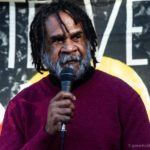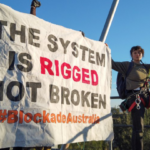Alabama Begins Gassing Inmates to Death, With Other US States Set to Follow

The US state of Alabama executed Kenneth Eugene Smith on 25 January, and whilst US authorities killing a person as a result of being sentenced to death by a court is nothing new, as it’s long taken place, what has caused quite a stir is the move to use nitrogen hypoxia as the agent of death.
Nitrogen hypoxia is an execution method that involves a respirator mask being place over the prisoner’s face, and instead of oxygen, the device produces nitrogen gas, which is supposed to knock the subject out within seconds and kill them in minutes. But this is not what happened to Smith.
Witnesses have reported a long painful procedure that took close to several dozen minutes. Yet, Alabama officials have stated that Smith was put to death in a humane manner, and the state of Ohio has since announced his execution has reinforced its plans to start gassing inmates as well.
Ohio hasn’t executed a prisoner since 2018, as the governor declared lethal injection no longer viable, due to a judge having ruled it causes “severe pain and needless suffering”. And the drugs involved in these injections are scarce due to a European ban on companies supplying them.
Executing civilians, however, no longer occurs in the majority of nations across the globe, and when the well-known fact that the US, a nation that considers itself a bastion of human rights, remains on the list of the 55 countries that applies the practice is raised, it continues to be met with disbelief.
Botched to death
Smith was convicted of the murder of Elizabeth Sennett in Alabama’s Colbert County on 18 March 1988. The now deceased man was hired to kill the wife of pastor Charles Sennett, who turned out to be the person who issued the contract for the killing that was carried out via stabbing and beating.
A jury found Smith guilty of murder in 1989, with 10 of the 12 jurors, the number needed to secure the death penalty, voting in favour of it.
But when a lethal injection procedure was to take place on 17 November 2022, a court issued a stay of execution as Smith was being strapped to the gurney.
The inmate, however, was not informed of the postponement, and instead remained tied down for another four hours, during which prosecutors attempted to lift the stay, while executors repeatedly tried to insert the intravenous execution line into him, causing much pain of which he complained.
Indeed, so problematic was the procedure that was supposed to have a stay placed on it, that the execution team turned the gurney on its side and held Smith upside down in the crucifixion position, as repeated attempts were made to insert the needle under his collarbone, without success.
But last month’s gassing of Smith wasn’t much better. Reverend Jeff Hood witnessed the execution, and he told Democracy Now that it was “the most horrible thing he had ever seen”, as Smith thrashed his head back and forth for minutes on end, and the mask filled up with body fluids.
The slow death of execution
The UN Human Rights Office warned Alabama on 16 January, that it should call off its gassing of Smith, as it likely amounts to torture, and it could breach international law.
The impact that nitrogen has on human bodies is poorly understood, which is why many are against the gassing procedure.
However, Ohio has now determined to start gassing people with nitrogen, joining Alabama, Mississippi and Oklahoma, states that have all passed legislation facilitating this.
Twenty seven US states continue to have the ability to execute, along with the federal government, while only 20 are currently able to hand down death sentences. And more of these states are expected to turn to gassing, as an alternative to lethal injection, despite the obvious issues around it.
Amnesty International reports annually on the state of execution around the globe. And the human rights organisation reports that in 2022, the last year with records currently available, 2,016 death sentences were issued in 52 countries, whilst 883 people were put to death by 20 countries.
In 2022, executions were carried out around the globe, via hanging, beheading, lethal injection and shooting. China executed the most people that year, followed by Iran, Saudi Arabia, Egypt and then the United States, which continues to be the only western nation to carry out the procedure.
And despite 112 nations, including Australia, having abolished the death penalty in law by 2022, there were still 28,282 prisoners sentenced to death around the planet at the end of that year.
Keeping the cycle alive
“Whenever a person or a state kills another person, they’re undermining the fundamental principle that each life has dignity and value,” said then Capital Punishment Justice Project president Julian McMahon. “And from that simple principle, many other rights flow into the community.”
McMahon further told Sydney Criminal Lawyers in 2017, that, in his opinion, societies where execution continues to take place also suffer from “other grave injustices”, such as mistreatment of prisoners, torture and corruption.
Formerly known as Reprieve Australia, the Capital Punishment Justice Project was established in 2001 to provide legal assistance to Australians who’ve been sentenced to death overseas. And it formerly campaigns to see the practice brought to an end on the global stage.
McMahon, a barrister, had defended Australians Andrew Chan and Myuran Sukumaran, who were sentenced to death in 2006 in Indonesia, due to their involvement in the 2005 Bali Nine heroin smuggling ring.
And despite a huge campaign to prevent the men’s death, both were executed by firing squad in 2015.
“You know, it’s hard to believe that, as a modern society, that we are still so addicted to killing each other,” Reverend Hood told Democracy Now host Amy Goodman on 30 January. And he’s witnessed five executions, four of which were from lethal injection and he considers the gassing the worst.
“And, of course, as we kill each other, we teach each other, we teach our young people, to continue killing as a form of vengeance and as a perpetuation of violence,” he added.







